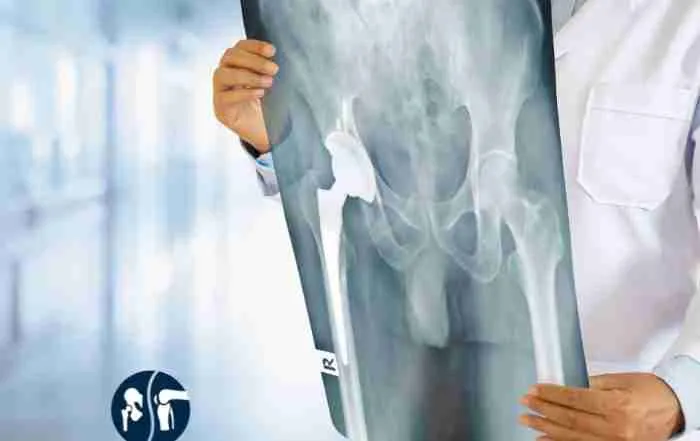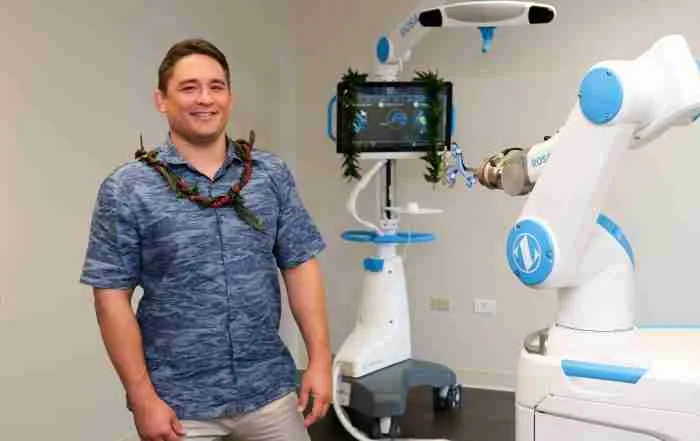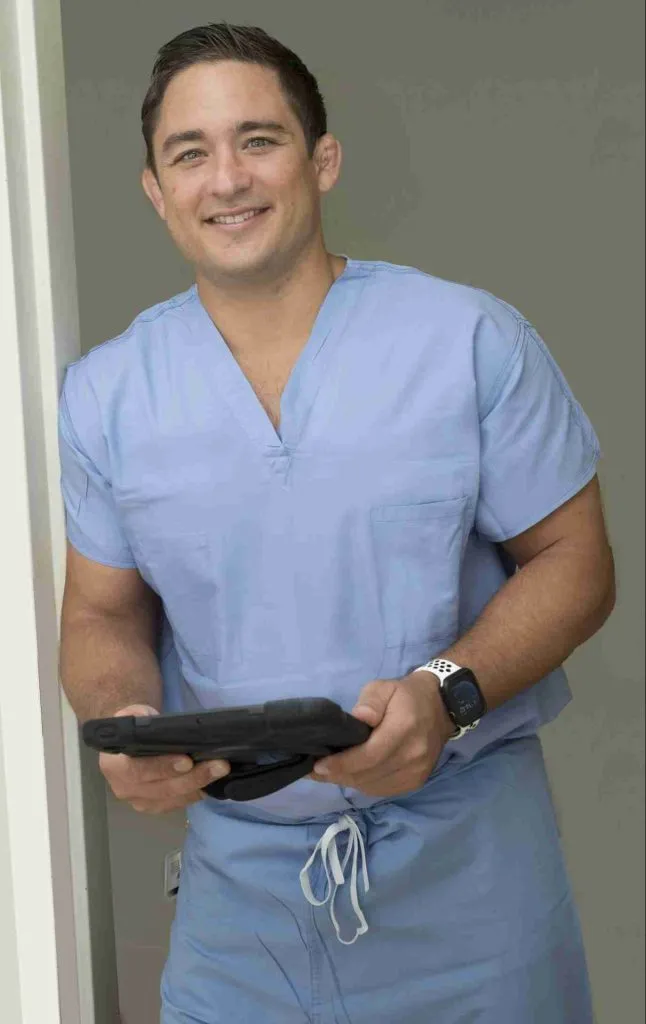Talk with Your Revision Hip Replacement Today!
Choose Dr. Morton as your Revision Hip Replacement Surgeon Today!
- Board-certified, Fellowship Trained Hip Surgeon
- Experienced Orthopedic Surgeon
- High success rate in treating failed hip replacements
- Regularly cares for patients with complex problems
- Well-versed with modern techniques and stays on top of the latest research
- Performs revision knee replacements
- Fellowship-trained and specialist in hip surgery
- Trauma Surgeon at Level 1 Trauma Center – Queen’s Medical Center
Revision Hip Replacement Surgery
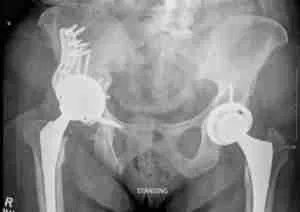
Fracture
A broken bone (also known as a fracture) occurs around the components of the implant after a trauma or fall. Many patients who have a broken bone around their implant require surgery. Dr. Morton will evaluate the amount of remaining bone around the implant, loosening of the implant, and the location of the break. After the evaluation, he will discuss with you
Reaction to Metal Ions
With long-term use, the metals in implants can break down and cause inflammatory reactions in the soft tissue. This is often exacerbated in metal-on-metal hip replacements. Should there be significant damage to the bone and soft-tissue a revision surgery may be needed.
Heterotopic Ossification
It is not uncommon to see areas around your hip replacement that calcify on x-ray. This calcification is called heterotopic ossification. For most people, heterotopic ossification is of no consequence. Rarely, this ossification can cause your hip to become very stiff and lose motion. When this occurs, you may require surgery to remove the excess bone. Often planning for this surgery may require advanced imaging to plan and make sure that your nerves and arteries are not involved.
Infection
If bacteria is able to find its way to your hip replacement, infection can occur. Infection can start when you are first in the hospital, after you return home, or years later. Your risk of an infection can be worsened by underlying medical conditions you may have and risks from exposure. As the bacteria develops, it can develop a “biofilm” which surrounds the bacteria, insulating it from antibiotics Hip replacement infections can cause pain, drainage, and hip instability. There are few good options for infected total hips. Dr. Morton will discuss with you options including removal of your hip replacement, revision, surgical debridement, or antibiotic suppression. Often, multiple surgeries are required to cure an infected total joint.
Implant Wear and Loosening
The cause of loosening isn’t always clear. Repetitive high-impact activities, high body weight and wear of the plastic liner between the ball and metal cup could be contributing factors. There is a higher risk for loosening of total hip replacements for patients who undergo a hip replacement at a young age. As the plastic component wears out, the tiny particles are attacked by your body’s immune system. When the immune system attacks healthy bone around your implant, it leads to a condition called “osteolysis”. Loose implants lead to a painful hip replacement.
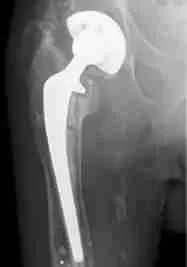
Recurrent Dislocation
The native hip joint is a ball-and-socket joint. An artificial hip is at a much higher risk for a dislocation than a native hip. Trauma and certain hip positions may cause the ball to escape from the socket. When this happens, your hip is considered dislocated, and can be very painful. Multiple hip dislocations may require you to have a surgery to realign your hip socket. Sometimes you may require a specially designed implant called a “constrained liner” to prevent hip dislocations.
Preparing for Surgery
A revision hip replacement may be a salvage operation and often requires more extensive preparation. You will need to have your previous medical charts so that they may be to be reviewed. Dr. Morton will evaluate all your imaging and x-rays. Occasionally he may order more advanced imaging such as a CT or MRI. Laboratory tests will be ordered to determine if your hip is infected or having a reaction to metal components in your hip.
Risks
Related Pages
Speedy Recovery: Practical Tips for a Faster Recovery After Knee and Hip Replacement
Introduction Hip and Knee Arthroplasty, more commonly known as hip and knee replacement surgery, is a widely performed procedure that offers a new lease on life for individuals grappling with severe knee conditions, including [...]
Understanding the Different Types of Total Hip Bearings
Total hip arthroplasty, commonly known as hip replacement, is a surgical procedure that replaces the hip joint with an artificial one. The artificial joint, or implant, consists of several components, one of which is [...]
Tips on Returning to Pickleball after Hip or Knee Replacement
[toc] What is Pickleball? Pickleball is a fun and exciting sport enjoyed by people of all ages. Its simple rules and low-impact nature make it an excellent option for people who want to stay [...]
The Importance of Nutrition After Surgery
The body's nutritional demands increase after surgery: When the body enters a higher metabolic state, it requires more energy. Muscles can become smaller as a result of trauma or inactivity, extending recovery. The stress [...]
Bikini incision for Anterior Approach Robotic-Assisted Total Hip Replacement: Superior Cosmetic Result
One of the main reasons people elect to have a total hip replacement is for pain relief. However, many are also concerned about the potential scarring that can occur with this type of surgery. [...]
Am I Too Young For Hip Replacement?
You may be asking yourself, "Am I too young for a hip replacement surgery?" The answer is: it depends. Hip replacement surgeries are becoming increasingly common in younger adults, and there are many factors [...]


